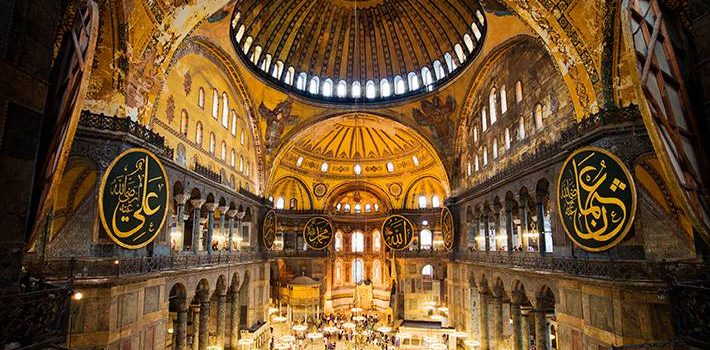By converting Hagia Sophia, a museum, into a mosque, Turkish President Recep Tayyip Erdogan has surely pleased Islamists. The act has also underlined a disturbing characteristic about Islam—its desire to obliterate non- and pre-Islamic past. For, as a mosque, Hagia Sophia signified its conquest over Christendom in 1453; now it signifies Turkey’s tryst with radical Islam. And a sharp break from Mustafa Kemal Atatürk’s secularism and nationalism. Atatürk, the father of modern Turkey, had abolished the caliphate in March 1924 and religious schools.
The next month, religious courts were done away with, along with the system of Islamic law. Religious seminaries and brotherhoods, where fundamentalism thrives, were also abolished. He also emphasized the emancipation of women, who were oppressed because of the traditional Muslim codes. Polygamy was prohibited. The education system was modernized. The Latin alphabet replaced the Arabic script for the Ottoman Turkish language.
More importantly, Ataturk took pride in the non- and pre-Islamic past of his country. He believed that the Turks had developed a great civilization in Central Asia way back in the 9th century BC; that they had remarkable scientific and technological achievements to their credit. He did his best to de-Islamize Turkey and glorify its pre-Islamic history. But Erdogan has been able, to a large extent, undo the great achievements of Ataturk’s. Why and how? The answers pertain to the essence of Islam rather than to Erdogan’s political astuteness.
Etymologically, ‘Islam’ means submission—that is, submission to the will of Allah. And it is Muhammad and the clergy who make the will of Allah evident. This submission is not just a matter of personal prayers and theology; it permeates Muslim customs, traditions, social conventions, cultural norms—in short, it permeates Islamic modus vivendi.
Islam is a complete world in itself, with every aspect of the life of the faithful tightly regulated and monitored, even the behavior in bedroom and toilet. It is also a totally closed world. Muslim clergy ensures that it remains a closed world, much to the suffering of millions of Muslims who favor liberty and openness in life, culture, and religion. Muslim clergy frown at even a hint of freethinking, exegesis, and assimilation with other non-Islamic cultural and spiritual traditions.
The never-diminishing influence of Salafists and Wahhabis in the Middle East and Tablighis in the Indian subcontinent is a testimony to exclusivist core of Islam. This core doctrinally prohibits an assimilation with anything non- or pre-Islamic. Like an invasive species (e.g., water hyacinth) which unbalances ecology and destroys diversity of a habitat, Islam dispenses with the underpinnings, wellsprings, and fonts of non- and pre-Islamic cultures and civilizations.
The pagan Santa Claus became a Christian icon; local deities and customs blended with the great tradition of Hinduism; but the advent of Islam meant the demise or marginalization of all that was non- and pre-Islamic. Worse, it is considered blasphemous to seek solace in anything other than Islamic: since Islam is the absolute and only truth, a journey outside it is anathema.
So, with all wells dry, contact with the external world forbidden, and radical exegesis practically ruled out, the only reservoir left to draw intellectual and spiritual sustenance from is that of pure Islam. Erdogan draws from that toxic reservoir. This toxicity permeates his politics, and destroys Hagia Sophia.




















